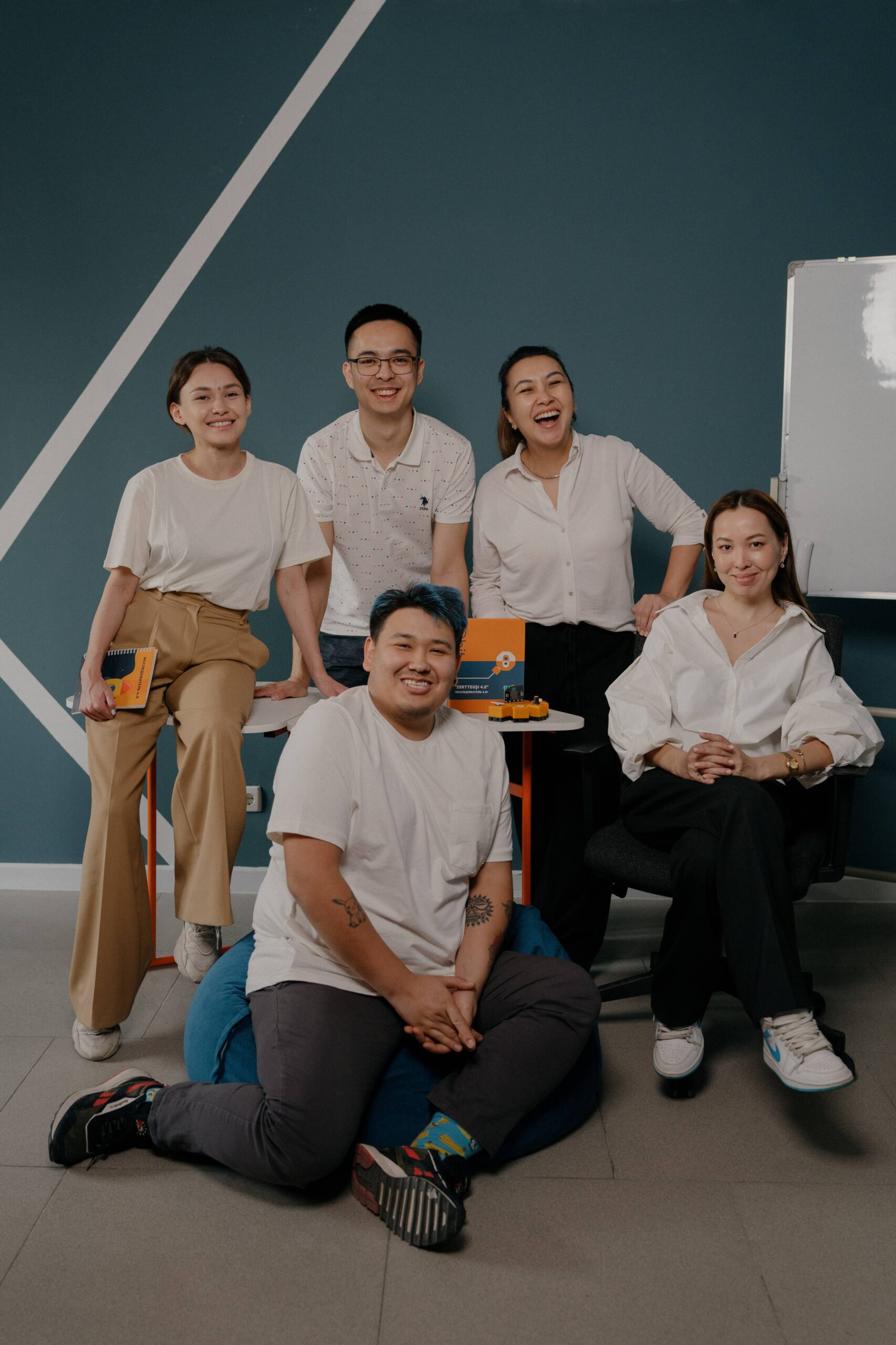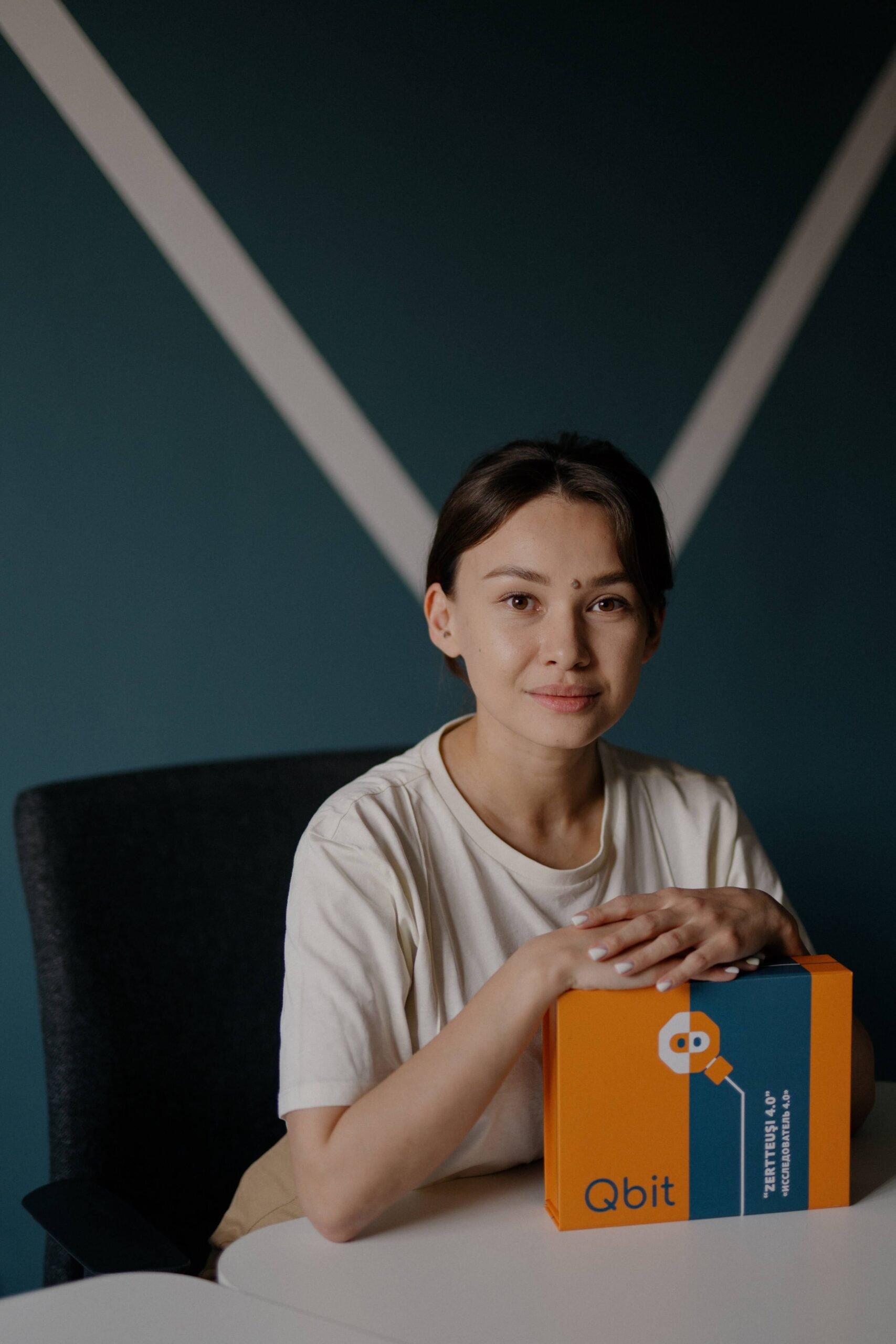ASTANA – QBit, an education robotics set created by Kazakh company Stem Solutions, is used in over 500 educational institutions across the country. Its creators believe QBit has several advantages over the sets provided by foreign manufacturers.

QBit team. Photo credit: Stem Solutions.
Rustem Yermekov and Madina Tasibekova, founders of Stem Solutions, spoke to The Astana Times about how the product was created, their mission and plans, including overseas expansion.
Yermekov was always fond of creating hardware. While studying at the Akmolinsk Polytechnical College, he launched courses on robotics.
He then started teaching robotics in Almaty. Tasibekova was supplying the equipment for his school. That’s how the future business partners met.
Yermekov and Tasibekova established the robotics school Star Kid. The business was going well until the Covid-19 pandemic hit and educational institutions closed. They started thinking about how to adapt to the new conditions.
What is QBit?
QBit consists of the standalone micro:bit board, which was developed by the BBC company. The board makes programming accessible to children.

Rustem Yermekov. Photo credit: Stem Solutions.
The base module enables the board to work from any device (computer, smartphone, or tablet). Other modules called “bits” are connected via magnetic connectors, without wires. Each of the bits can be turned into a gadget.
QBit is accompanied by a user-friendly manual providing interesting facts for children and teachers.
First came the idea
“When we were teaching robotics, we noticed that the equipment that we used is obsolete – sometimes there is no manual, sometimes the sets are too complex, expensive, or they break down often. We outlined a full list of problems and decided to solve them with our set,” said Tasibekova.

Madina Tasibekova. Photo credit: Stem Solutions.
That’s how they started working on the first prototype of QBit. “I put a 3D printer in an apartment and started working,” Yermekov recalls.
Initially, he lacked the required skills to realize the idea.
“In a fairly short period of time, I learned the Fusion 360 program, which I used to begin to create cases. I learned how the boards are made,” he said.
The creation of the product
Now it was time to start manufacturing.
“Initially, we wanted this device to be completely made in Kazakhstan. We were looking for those who would make cases for us in Kazakhstan, but nobody took it on, because we have a rather complicated case shape. There is no production of boards in Kazakhstan at all,” explained Yermekov.
They decided to order production in China and assemble in Kazakhstan. According to Yermekov, despite the pandemic complicating the process, the first product was created in a very short time – 3 months.
To date, the product is still under development after 27 iterations.
How QBit facilitates STEM education
According to Tasibekova, the educational sets at schools lack Kazakh-language manuals. There is also no proper training for the robotics teachers and sets for inclusive education. They decided to fix this.
“We tested out the product with children with cerebral palsy together with the ITeachMe Fund. We have all the Kazakh-language manuals and we provide masterclasses for the teachers,” she explained.
Tasibekova noted that the company faces certain difficulties with sales because of the stereotype that Kazakh products are inferior in quality to imported products.
A shortage of qualified teachers is also an issue, according to Yermekov. “We recently trained a group of teachers for free to test and validate our methodology,” he said.
Ambitions for the future
“Our mission is to create simple and understandable tools for schools and teachers with which they can learn and explore the world,” shared Yermekov.
The founders invested $150,000 of their personal funds in the QBit project and are yet to break even. Yermekov said they plan to accelerate the sales and started developing their own salesforce after switching from the services of the exclusive distributor.
Yermekov recently visited Silicon Valley after he won the IT Teacher of the Year in Central Asia award and is considering working in the American market.
“I just got back from the United States and met quite interesting people there. I presented our product to everyone with whom we met. People gave us good feedback and expressed interest. Maybe we will go there,” he said.
Apart from QBit, Stem Solutions have developed a new product – micro:lab – a small laboratory, which children can use in chemistry, biology, and physics lessons. They plan to bring it to the market soon.


